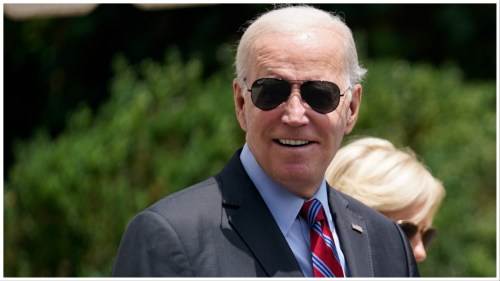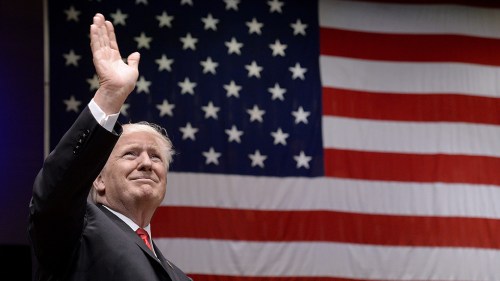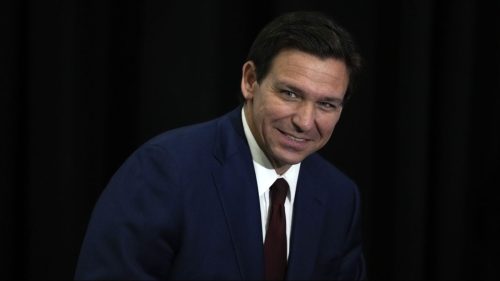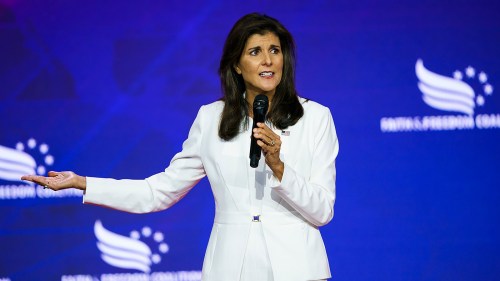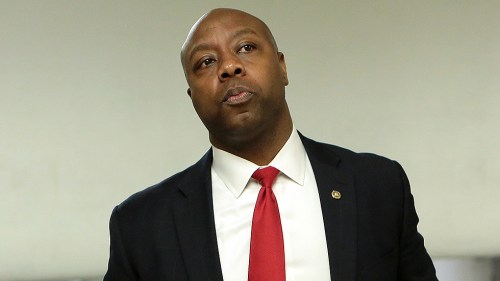Candidates face tricky balancing act on Trump at first GOP debate
Republican candidates attending the first GOP presidential debate Wednesday will face the challenge of having to separate themselves from former President Trump while also not alienating his devoted supporters.
Trump said Sunday he won’t attend the debate, giving his rivals a chance to make the case for their respective candidacies without having to compete for attention with the former president.
But the situation poses a conundrum for candidates such as Florida Gov. Ron DeSantis (R) and South Carolina Sen. Tim Scott (R), who must be careful not to cross Trump’s supporters while also winning over at least a portion of them.
“If I were thinking of it as a strategic matter, I’d like to be able to emerge from this debate as the principal non-Trump alternative,” said Scott Jennings, a Republican strategist who worked on former President George W. Bush’s campaigns.
Throughout much of the 2024 race so far, the Republican candidates have largely avoided direct criticisms of Trump and been among his defenders for each of the four indictments that have been filed against him in multiple jurisdictions.
Most have echoed his arguments of a two-tiered justice system that is politically motivated in targeting him with so many in the Republican primary electorate solidly behind him, demonstrated by his consistently significant leads in the polls.
That has forced a difficult juggling act for the other candidates to try to present themselves as the future of the party without invoking Trump’s criticism or his base’s anger. Experts said that dynamic will likely continue and cause the other candidates to turn their attention toward each other in competition for taking the second spot in the polls to Trump.
“I don’t think you’re going to meaningfully degrade Trump in this debate, but you might score points on someone else or perhaps separate yourself from the rest of the rabble,” Jennings said.
DeSantis has consistently placed second to Trump in primary polling so far, but his campaign has struggled significantly in recent months with not being able to close the gap on the former president, cutting staff and losing ground in a few national and and state polls.
With the Florida governor’s hiccups, Jennings said DeSantis should “wear six suits of armor” and be prepared to take on attacks from his fellow competitors on the stage. He said DeSantis is still the main alternative to Trump, but other candidates such as conservative entrepreneur Vivek Ramaswamy, who has been closing in on DeSantis in some polls, will seek to take advantage of the struggles.
The latest controversy for DeSantis’s campaign came Thursday when a debate memo from the super PAC supporting him, Never Back Down, was briefly leaked on the website of a firm owned by the PAC’s chief strategist. The memo called for DeSantis to defend Trump and attack other candidates gaining momentum behind him, especially Ramaswamy.
Strategists were mixed on whether DeSantis will follow the guidelines from the memo and if the leak was intentional or accidental, but said DeSantis could have more of a spotlight on him without Trump in the room, offering both opportunities and risks.
Aaron Kall, the director of debate at the University of Michigan and an expert on presidential debates, said DeSantis might be the most likely “punching bag” for the other candidates with Trump’s absence.
He pointed to a Republican debate held in Des Moines in January 2016 just before the Iowa caucuses that Trump skipped. Sen. Ted Cruz (R-Texas), who was polling in second at the time, received the brunt of attacks from several other notable candidates including Sens. Marco Rubio (R-Fla.) and Rand Paul (R-Ky.).
“The headlines surrounding the debate were ‘A rough night for Cruz,’ because he was being attacked by all sides,” Kall said, noting that the layout of the candidates’ positions has the highest-performing candidates in the middle of the stage. “So you’re going to have Gov. DeSantis front and center and just kind of get incoming fire from both sides and the other six candidates.”
Kall said he thinks DeSantis is prepared for the attacks and understands the stakes of his debate performance for his candidacy. He added that moderators “love” setting up conflicts between candidates to get a “back-and-forth” and will have total control over the questions being asked.
“We have a two- or three-person fight for finding out who is going to be the clear No. 2 to Trump and the debate could help sorting that out,” he said.
A Republican strategist who requested anonymity because he is associated with a campaign said not every candidate will have the same goals, which could cause them to take different approaches in how they decide to concentrate on a major policy proposal they have or on attacking Trump or another candidate.
They said DeSantis will have a different mission from former New Jersey Gov. Chris Christie (R), who has been among the most vocal critics of Trump in the race. Polling has recently shown Christie gaining traction in the first primary state of New Hampshire, with an Emerson College Polling survey on Tuesday placing him in second at 9 percent.
The strategist said Christie’s goal will be to get “cameras on me” going after Trump in the “most creative and colorful way.” They said others need to consider if they want getting a “big idea” across or incorporating a strong attack line as a way to differentiate themselves from the others.
“That’s really the choice you’re looking at. Just really a few minutes that you’ll have to be able to get what you want to get in,” they said.
But some strategists said they expect Trump’s absence will allow candidates to focus on policy and not get bogged down with Trump’s “ability to make the story about him.”
Republican strategist David Capen said candidates can convey to the audience that they are “honest, authentic and caring” by focusing on policy instead of personal attacks, and Trump skipping will put them in a better position to do so.
“We already know how President Trump carries himself, so this is a valuable opportunity for Gov. DeSantis to differentiate himself and elevate the conversation by focusing on kitchen table issues like jobs, education and national security,” Capen said.
GOP strategist Rina Shah said she expects three different approaches on the stage: candidates who “tiptoe” around Trump, those who “go for the jugular” and those who “behave like they’re the only thing that exists.”
Shah said she does not expect to see a major change in candidates’ approach to Trump than they previously have had. She said she expects former United Nations Ambassador Nikki Haley to focus on her ideas and ignore Trump, and DeSantis and Ramaswamy may do the same as candidates who have been polling in the higher tier.
She added that more time is needed to know if candidates might change their tune and confront Trump more directly in future debates because of the rapid developments with Trump’s legal challenges.
“This is unlike any other presidential campaign cycle we’ve ever been in. There’s no comparison. Not even 2016, because of how much is in motion,” Shah said.
Copyright 2023 Nexstar Media Inc. All rights reserved. This material may not be published, broadcast, rewritten, or redistributed. Regular the hill posts
